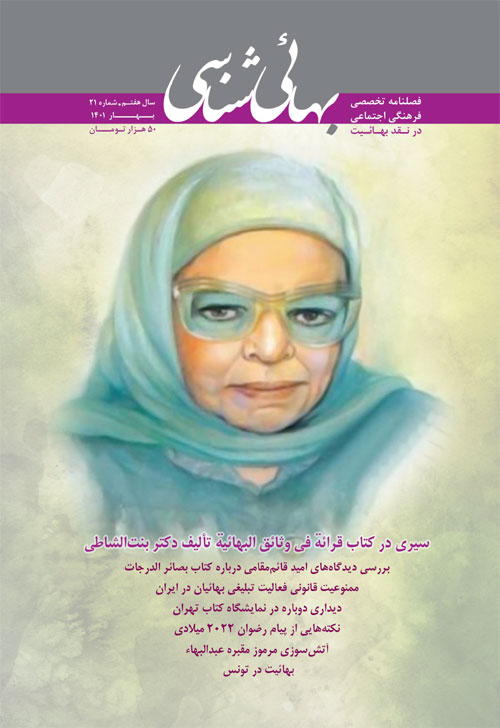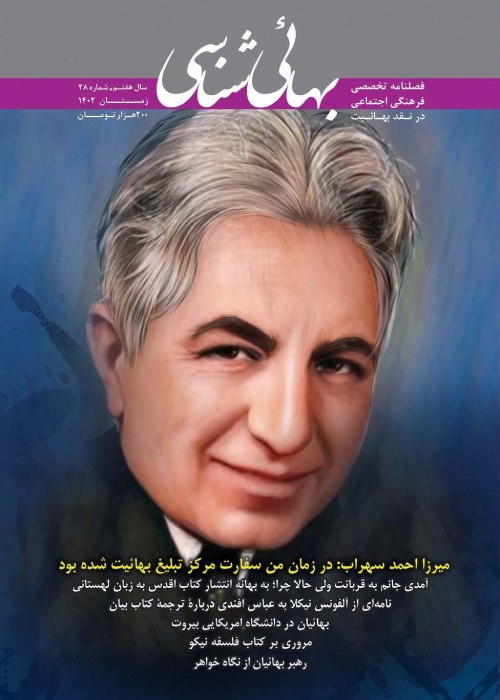فهرست مطالب

نشریه بهائی شناسی
پیاپی 21 (بهار 1401)
- بهای روی جلد: 500,000ريال
- تاریخ انتشار: 1401/03/25
- تعداد عناوین: 14
- سرمقاله
-
صفحه 4
-
صفحه 8
-
نگاهی دین پژوهانه به بهائی گری و تبلیغات آن / مصاحبه با آقای دکتر همتیصفحه 38
جناب آقای دکتر همایون همتی (متولد 1338 ش، ایلام)، علاوه بر تحصیل در رشته فلسفه و اخذ مدرک فوق دکتری از دانشگاه بیلفلد آلمان، دروس متداول حوزوی را نیز آموختهاند. ایشان افتخارات و مسوولیتهای مختلفی را تاکنون داشتهاند، ازجمله: اخذ نشان ملی پژوهش، رایزن فرهنگی ایران در آلمان و رئیس دانشکده روابط بینالملل وزارت امور خارجه. ایشان علاوه بر تدریس دروس حوزوی و دانشگاهی به راهنمایی و مشاوره پایاننامههای دانشجویان نیز مشغول هستند و تاکنون چندین جلد کتاب و مقاله به رشته تحریر درآوردهاند. یکی از آثار ایشان کتاب «البابیون و البهائیون» است که نسخه دیجیتالی آن در اینترنت موجود است.
-
دختر ساحل و بهائیت / سیری در کتاب قراءه فی وثائق البهائیه دکتر عائشه بنت الشاطئصفحه 72
خانم دکتر بنتالشاطی از بانوان فرهیخته و مشهور جهان اسلام است که اگرچه زادگاهش مصر بوده و در آن کشور بالنده شد، اما با آثار پژوهشی و نگارشی و فعالیتهای آموزشی در دانشگاههای کشورهای آفریقایی و آسیایی، شهرتی جهانی پیدا کرد. او در 37 سالگی دکترای خود را از دانشگاه قاهره دریافت نمود و با یکی از اساتید خود ازدواج کرد و تا 85 سالگی که دعوت حق را لبیک گفت لحظهای از تحقیق و تدریس و نگارش غافل نماند. وی علاوه بر تربیت بسیاری از جوانان کشورهای اسلامی، شصت کتاب و صدها مقاله از خود به یادگار گذاشت. بنتالشاطی با کتاب تفسیر خود به نام التفسیر البیانی للقرآن الکریم به شهرت رسید و با آثاری درباره زنان اهلبیت؟عهم؟، نسل معاصر را با این بانوان آشنا ساخت. او نخستین بانوی فرهیختهای است که در جهان اسلام، به موضوع بهاییت پرداخت و کتابی در حدود چهارصد صفحه در این زمینه با عنوان قراءه فی وثایق البهاییه در بررسی ریشههای پیدایش این گروه و چالشهایی که در مصر ایجاد کردند و نقد آموزههای آنان نوشت. این مقاله به معرفی تفصیلی دیدگاههای این بانوی فرهیخته در کتاب وثایق میپردازد.
-
صفحه 118
بهاییان در کشور تونس از حدود سال 1921م. و با ورود اولین مبلغ بهایی از مصر، به نام محیالدین الکردی پدید آمدند. آنان ادعا میکنند که در صد سال گذشته در کشور تونس در راستای ترویج آیین بهایی و اصول آن فعالیتهای قابلتوجهی کردهاند. جمهوری تونس کشوری در شمال آفریقا است و حدود 8/11 میلیون جمعیت دارد که بیش از 99 درصد آنان مسلمان هستند. مسیحیان، یهودیان، بهاییان و کافران و غیرباورمندان به دین الهی، کمتر از 1 درصد از جمعیت کشور را تشکیل میدهند. گزارش وزارت امور خارجه آمریکا در سال 2011 تعداد اعضای جامعه بهایی تونس را حدود 150 نفر تخمین زده است. این موضوع نشان میدهد که جامعه بهایی تونس توانایی جذب افراد به آیین خود را ندارد و پس از صد سال تلاش و کوشش تبلیغی تنها کمی بیش از صد نفر را توانستهاند به کیش خود درآورند. بهعلاوه، دولت تونس بهاییت را بهعنوان فرقهای بدعتآمیز و خارج از اسلام میشناسد. بااینحال، بهنظر میرسد برخلاف تعلیم بهایی مبنی بر "الزام بهاییان به اطاعت از قوانین کشور متبوع"، درحالحاضر نهادها و موسسات اداری بهایی در کشور تونس تشکیل شده و مشغول فعالیت هستند.
-
ممنوعیت قانونی فعالیت تبلیغی بهائیان در ایران / براساس قانون الحاق دو ماده به قانون تعزیرات و مجازات های بازدارنده) 499 و 500 مکرر(صفحه 138
چکیدهدر سال 1399 قانون الحاق دو ماده به کتاب پنجم قانون مجازات اسلامی (تعزیرات و مجازاتهای بازدارنده)، تصویب شد. طبق ماده 500 مکرر، اگر «در قالب فرقه، گروه، جمعیت یا مانند آن و استفاده از شیوههای کنترل ذهن و القائات روانی»، «هرگونه فعالیت آموزشی و یا تبلیغی انحرافی مغایر و یا مخل به شرع مقدس اسلام» انجام شود، مجازاتهایی برای آن درنظر گرفته میشود. «تامین مالی و یا هر نوع حمایت مادی دیگر از گروههای موضوع این ماده» و «ارتباط گروههای موضوع این ماده با خارج از کشور برای دریافت حمایت یا هدایتهای تشکیلاتی موجب تشدید مجازات» میشود.
این مقاله به تحلیل فعالیت تبلیغی و تشکیلاتی بهائیت در ایران، در پرتو این قانون پرداخته و جایگاه تبلیغ اقلیتهای دینی رسمی و گروههایی همچون بهائیت را از منظر قانون اساسی ایران و معاهدات حقوق بینالملل بررسی کرده است. باتوجهبه تعالیم و نصوص مصرحه در آثار دستاول و موردقبول بهائیان، نشان داده شده که محتوای تبلیغات برنامهریزی شده بهائیان، که با قصد و نیت تغییر دین و بهائی کردن ایرانیان صورت میگیرد، مصداق بارز اقدامات ممنوعه و نهیشده در این قانون است. همچنین تشکیلات بهائی در کشور ایران نیز مصداق گروه دارای فعالیت مجرمانه در چارچوب این قانون است که با استفاده از حمایت و پشتوانه ارتباط با خارج از کشور، بهمنظور حمله به دین رسمی کشور، حمله به احکام و شریعت و تضعیف دین رسمی کشور و تلاش برای ضربه زدن به حکومت و اخلال در نظم عمومی کشور، فعالیت میکند.
-
بهائیت و مبنای توسعه مدرن امر / تحلیلی از پروژه بورس تحصیلی و مطالعات بهائیصفحه 210
-
صفحه 230
-
Page 72
Dr. Bint Al-Shati is one of the educated, prominent and famous women in Islamic world. Although she was born in Egypt and grew up in that country, she gained worldwide fame through her researches, writings and educational activities in the universities in African and Asian countries. At the age of 37, she received her doctoral dissertation from Cairo University and married one of her professors. She left behind sixty books and hundreds of articles. Bint Al-Shati became famous with her book Tafsir called "Al-Tafsir Al-Bayani for the Holy Quran" and introduced the contemporary generation through her works about the women of the Ahl ul-Bayt (as). She is the first educated woman in the Islamic world to address the issue of the Baha’i Faith, and a book of about four hundred pages entitled "Reading the Baha’i Documents" examines the origins of the group and the challenges it posed in Egypt, and critiques its teachings.This article introduces in detail the views of this educated lady about the book of Baha’i Documents.
Keywords: Bint Al-Shati, Baha'ism in Egypt, Al-Azhar Fatwa, Nineteen in Baha'ism, Baha'ism andZionism, Baha'ism, Britain, Palestine, 'Abdu'l-Baha, Golpayegani, Baha'i Documents -
Page 118
Baha’ism in Tunisia originated around 1921 with the arrival of the first Baha’i Missionary from Egypt, Mohiuddin al-Kurdi. They claim to have made significant strides in promoting the Baha’i Faith and its principles over the past 100 years in Tunisia. The Republic of Tunisia is a country in North Africa with a population of about 11.8 million, of which more than 99 percent are Muslims. Christians, Jews, Baha'is, and infidels and non-believers make up less than 1 percent of the country's population. A 2011 State Department report put the number of members of the Tunisian Baha'i community at about 150. This shows that the Baha'i community in Tunisia is not able to attract people to its religion, and after a hundred years of propaganda efforts, only a little over a hundred people have been able to convert to their religion. In addition, the Tunisian government considers Baha’ism as a heretical, non-Islamic sect. However, it seems that, contrary to the Baha’i Teaching that "Baha’is' obey the laws of the country", Baha’i institutions and administrative offices are currently active in Tunisia.
Keywords: Baha’ism in Tunisia, The Baha’is history in Tunisia, The Baha’is population of Tunisia, The ban of the propagation, Baha’i organization in Tunisia, Founders of the Baha'iFaith in Tunisia, Tunisian Baha'i National Assembly, Mohammed Ibn Musa -
Page 138
In 1399 H.S. (2020) the law of adding two articles to the fifth book of the Islamic Penal Code (punishments and deterrent punishments) was approved in principle 123 of the Constitution of the Islamic Republic of Iran . According to Article 500, if "in the form of a sect, group, population or the like and the use of mind control methods and psychological instincts", "any deviant educational or propaganda activity contrary to or contrary to the holy law of Islam" is carried out, facing the punishment. According to that law , "Financing or any other kind of material support of the groups subject to this article" and "communication of the groups subject to this article with abroad to receive support or organizational guidance” will increase the punishment. This article analyzes the propaganda and organizational activities of the Baha'is in Iran in the content of this law, and examines the position of the propaganda of official religious minorities and groups such as the Baha'is from the perspective of the Iranian Constitution and international law treaties. According to the teachings and texts approved in the writings of the Bahai Leaders and the orders of its organisation and accepted works of the Baha'is, it has been shown that the content of the planned Baha'i propaganda, which is done with the intention of converting the religion and thought of Iranians to Bahaism, is a clear example of prohibited actions. The Baha'i organization in Iran is also an example of a group with criminal activities within the framework of this law, which uses the support of foreign relations in order to attack the official religion of the country, attack the rules and Sharia and weaken the official religion of the country, and Attempts are being made to strike at the government and disrupt the public order of the country.
Keywords: Propaganda, Baha'i, punishments, constitution, foreign relations -
Page 172
Omid Ghaem Maghami (Associate Professor of Arabic and Middle Eastern Studies at New York State University and a follower of the Baha'i Faith) in his studies about the Book Basair al-Darajat has dealt with it and said it is alien to these two teachings. This article, as the first letter in the study and critique of his Mahdism views, intends to reach the inaccuracy of his views from both intellectual and methodological points of view and shows that the book Basair Al-Darjat, in itself, the finality of Islam and the Mahdism of the Twelfth Imam have been approved .
Keywords: The book of encounters with the absent Imam, the book of Basair al-Darjat al-Kubra inthe virtues of the family of Muhammad, the finality of the religion of Islam, the Mahdismof the Twelfth Imam -
Page 210
The first part of this article with attention to the keyword decoding “Baha, Rockefeller i Scholarship” ; studies the principles and objectives of the Baha'i Scholarship. In the second part of this article, with reference to the purposeful and organizational activity of the Baha'is in the United States, a part of the actions of satellite institutions in the United States will be pointed out. Some influential American foundations, such as Ford, Rockefeller, and Carnegie Endowment, have invested heavily in projects called the Cultural Cold War, backed by the powerful financial network of private-sector bankers. The strategy of cultural unification and globalization of culture and science is one of the most important goals of the project. The case (New Baha'i Studies) that has been going on in the United States since the time of 'Abdu'l-Bah. Then Shoghi has led to the establishment of large-scale Baha'i Foundations in the field of education and scholarships. Baha'i Foundations are also influential in the sustainable development of the United Nations Goals through their relationship with super-foundations such as Rockefeller and Ford. Thus, the project (New Bahai Studies) is not merely a scholarly endeavor, but a cover for the growing involvement of the Bahaism Ideology in the program of international development. There is a significant relationship between recent Baha'i studies and the expansion of satellite foundations and institutions in the United States. In this section, an analysis of the basis for the modern development of the Bahai Organization will be provided in the coverage of the United Nations Development Program.
Keywords: Baha'i Studies, Development, Scholarship, Institutional Order, World Order


